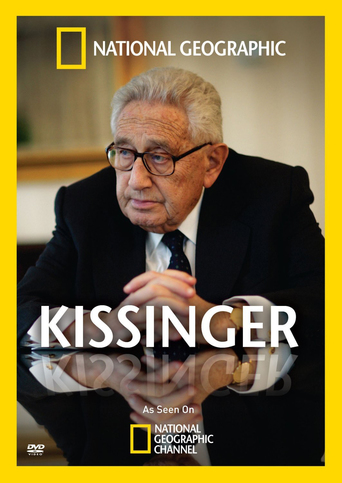

This is the programme of the week. In a superbly shot and edited feature-length documentary, the historian Niall Ferguson interviews Henry Kissinger and allows the diplomat known as "the private emissary for everything" to look back on his career with barely a hint of regret, far less repentance. "I certainly would go that same direction again," he says, "painful as some of the aspects of it were." He talks about the necessity to counter the threat from communism, the bombing of Cambodia ("It was the right decision that had to be taken"), the Nixon visit to China, the arms limitation agreement with the Russians, the impact of Watergate and the fall of South Vietnam. "I am unreconstructed in my conviction that Vietnam did not have to fall. We did that to ourselves." His description of liberating the concentration camp at Hannover-Ahlem at the end of the Second World War is deeply moving, and so — oddly enough — is his description of how Nixon asked him to pray in the Oval Office just before he resigned. The only time that he seems unsettled is when challenged over his support of the loathsome Pinochet regime in Chile. Like him or loathe him, it is a rare first-hand perspective on modern history.
... View MoreKissinger like you've never seen him before. I believe this is the most honest and forthcoming interview he has ever done. He was candid yet unapologetic about his decisions and role in some of the most controversial events and issues that took place during his time in the Nixon White House. I was born half a decade after President Nixon resigned from office so I didn't really know a whole lot about his Presidency (apart from Watergate). Therefore, there were many things in this documentary that I had no knowledge of. One of the most interesting stories that came out of Kissinger's retelling was his trip to China and the real reason for this trip to China. Nixon and Kissinger's rationale was based on the idea of "the enemy of my enemy is my friend" (referring to our contentious relationship with communist Russia). This was such a huge gamble because China was a self-contained closed country at the time, which made intelligence gathering almost impossible. Kissinger saw China as the answer to all of our problems. Making them our ally could force Russia to come to the bargaining table and end the Cold War. China could also facilitate some kind of peace treaty and help end the war in Vietnam as well. That is two VERY BIG birds with one heavy ass Chinese stone (lol).One of the most shocking things in the documentary came right at the end of Kissinger's interview. When asked about having regrets, he said no, and he would do the exact same thing if given another chance under the same circumstances (paraphrased). I don't want to give away everything he said in his interview because you need to watch it. I commend the director/interviewer for not focusing on Watergate. That story has been told a million times in a million different ways. Instead, the focal point of this documentary was Kissinger's experiences told in his own words from his unique perspective. Throughout the documentary, Kissinger delivers his story with spellbinding narration in his trademark gruff baritone voice. It's compelling, it's informative, it's intriguing, and it opens a door into the mind of one of the most fascinating figures in US history.
... View More